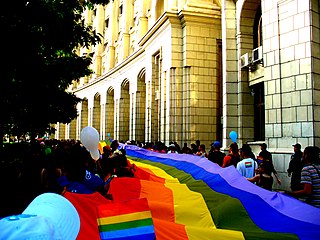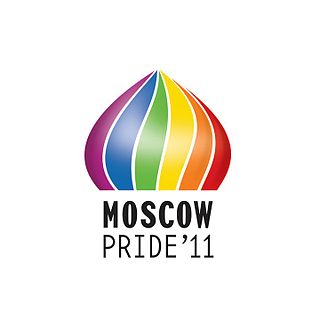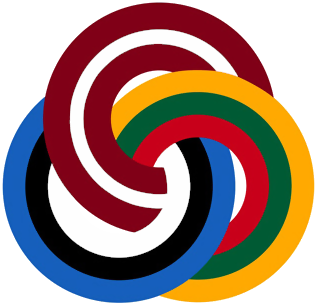Lesbian, gay, bisexual, transgender, queer, intersex, and asexual (LGBTQIA+) people frequently experience violence directed toward their sexuality, gender identity, or gender expression. This violence may be enacted by the state, as in laws prescribing punishment for homosexual acts, or by individuals. It may be psychological or physical and motivated by biphobia, gayphobia, homophobia, lesbophobia, and transphobia. Influencing factors may be cultural, religious, or political mores and biases.

A pride parade is an event celebrating lesbian, gay, bisexual, and transgender (LGBT) social and self-acceptance, achievements, legal rights, and pride. The events sometimes also serve as demonstrations for legal rights such as same-sex marriage. Most occur annually throughout the Western world, while some take place every June to commemorate the 1969 Stonewall riots in New York City, a pivotal moment in modern LGBT social movements. The parades seek to create community and honor the history of the movement. In 1970, pride and protest marches were held in Chicago, Los Angeles, New York City, and San Francisco around the first anniversary of Stonewall. The events became annual and grew internationally. In 2019, New York and the world celebrated the largest international Pride celebration in history: Stonewall 50 - WorldPride NYC 2019, produced by Heritage of Pride commemorating the 50th anniversary of the Stonewall Riots, with five million attending in Manhattan alone.

Lesbian, gay, bisexual, and transgender (LGBT) persons in Serbia face legal challenges not experienced by non-LGBT residents. Both male and female same-sex sexual activity are legal in Serbia, and discrimination on the basis of sexual orientation is banned in areas such as employment, education, media, and the provision of goods and services, amongst others. Nevertheless, households headed by same-sex couples are not eligible for the same legal protections available to opposite-sex couples.

Lesbian, gay, bisexual and transgender (LGBT) people in Ukraine face legal and social challenges not experienced by non-LGBT individuals; historically, the prevailing social and political attitudes have been intolerant of LGBT people, and strong evidence suggests this attitude remains in parts of the wider society. Since the fall of the Soviet Union and Ukraine's independence in 1991, the Ukrainian LGBT community has gradually become more visible and more organized politically, organizing several LGBT events in Kyiv, Odesa, Kharkiv, and Kryvyi Rih.

Lesbian, gay, bisexual, and transgender (LGBT) persons in Bosnia and Herzegovina may face legal challenges not experienced by non-LGBT residents. Both male and female same-sex sexual activity are legal in Bosnia and Herzegovina. However, households headed by same-sex couples are not eligible for the same legal protections available to opposite-sex couples.

Bucharest Pride, known previously as GayFest, is the annual festival dedicated to LGBT rights in Romania, taking place in Bucharest for nearly a week. Current event organizer is Kyle David Kipp. It first took place in 2004 and now occurs in May–June of each year, culminating with the March of Diversity. It is organised by the non-profit organisation ACCEPT, the country's largest lesbian, gay, bisexual and transgender (LGBT) rights organisation. The festival also receives funding from the Romanian Ministry of Health and the National Council for Combating Discrimination, as well as a number of private organisations, such as the Open Society Institute and the British Council in Romania.

Zagreb Pride is the annual LGBTIQ+ pride march in the city of Zagreb, Croatia, which first took place in 2002, as the first successful pride march in Southeast Europe. Zagreb Pride organizers say their work was inspired by the Stonewall Riots and the Gay Liberation Front. It is self-identified as LGBTIQ+ march and therefore in 2003 changed its name from Gay Pride Zagreb into Zagreb Pride. The Pride was organized by volunteer-based and grass-roots Organizing Committee that was formed each year. A new organization founded in 2008 as a non-governmental organization Zagreb Pride that also registered the use of the name as a brand. The organization is a member of InterPride, EPOA, IGLYO, ILGA-Europe and in 2010, together with Lesbian Organization LORI and Domino, it was the founding member of Croatian first national LGBT association, Center for LGBT Equality. Pride receives funding from the City of Zagreb and a number of international human rights organizations and embassies.

Lesbian, gay, bisexual and transgender (LGBT) people in Lithuania face legal challenges not experienced by non-LGBT residents. Both male and female same-sex sexual activity are legal in Lithuania, but neither civil same-sex partnership nor same-sex marriage is available, meaning that there is no legal recognition of same-sex couples.

Lesbian, gay, bisexual, and transgender (LGBT) people in Moldova face legal and social challenges and discrimination not experienced by non-LGBT residents. Households headed by same-sex couples are not eligible for the same rights and benefits as households headed by opposite-sex couples. Same-sex unions are not recognized in the country, so consequently same-sex couples have little to no legal protection. Nevertheless, Moldova bans discrimination based on sexual orientation in the workplace, and same-sex sexual activity has been legal since 1995.

Lesbian, gay, bisexual, and transgender (LGBT) rights in Slovenia have significantly evolved over time, and are considered among the most advanced in Eastern Europe. Slovenia was the first post-communist country to have legalised same-sex marriage, and anti-discrimination laws regarding sexual orientation and gender identity have existed nationwide since 2016.

Moscow Pride is a demonstration of lesbians, gays, bisexuals, and transgender persons (LGBT). It was intended to take place in May annually since 2006 in the Russian capital Moscow, but has been regularly banned by Moscow City Hall, headed by Mayor Yuri Luzhkov until 2010. The demonstrations in 2006, 2007, and 2008 were all accompanied by homophobic attacks, which was avoided in 2009 by moving the site of the demonstration at the last minute. The organizers of all of the demonstrations were Nikolai Alekseev and the Russian LGBT Human Rights Project Gayrussia.ru. In June 2012, Moscow courts enacted a hundred-year ban on gay pride parades. The European Court of Human Rights has repeatedly ruled that such bans violate freedom of assembly guaranteed by the European Convention of Human Rights.

Baltic Pride is an annual LGBT+ pride parade rotating in turn between the capitals of the Baltic states; Tallinn, Riga and Vilnius. It is held in support of raising issues of tolerance and the rights of the LGBT community and is supported by ILGA-Europe. Since 2009, the main organisers have been Mozaīka, the National LGBT Rights Organization LGL Lithuanian Gay League, and the Estonian LGBT Association.

The Ljubljana Marathon is a marathon organised in Ljubljana by the City Municipality of Ljubljana (MOL). It has been taking place since 1996 and attracts several thousand people each year.

Sofia Pride Parade is a peaceful march of LGBT people and their relatives and friends, which combines social and political protest with entertainment such as live concerts. It takes place every year in the month of June in Bulgaria's capital Sofia since 2008. The first Sofia Pride parade was held on June 28, 2008, on the same date as the Stonewall riots in New York City that occurred in 1969. Same-sex sexual activity became legal on May 1, 1968. Between 1968 and the collapse of communism in 1989, no publicly gay movements nor places of social gatherings existed. After democracy was reestablished in 1990, several gay bars and clubs opened doors in the capital of Sofia as well as in Varna and Plovdiv.
Homosexuality in Serbia was first criminalised from 1860 through various regimes, until it was decriminalised first in Socialist Autonomous Province of Vojvodina in 1977. When Vojvodina was reintroduced fully into the Republic of Serbia legal system during the breakout of Yugoslavia, it was recriminalised again, until 1994, when it was decriminalised in the entire Serbia.

Columbus Pride is an LGBTQ festival in Columbus, Ohio, hosted by Stonewall Columbus. The event first took place in 1981, and has grown into the second largest LGBT pride event in the Midwest, behind Chicago. The pride parades typically include marching bands, firetrucks, motorcycles, and floats covered in rainbow flags or balloons.

There have been pride parades in South Africa celebrating LGBT pride since 1990. South African pride parades were historically used for political advocacy protesting against legal discrimination against LGBT people, and for the celebration of equality before the law after the apartheid era. They are increasingly used for political advocacy against LGBT hate crimes, such as the so-called corrective rape of lesbians in townships, and to remember victims thereof.

The BIH Pride March is the LGBT pride parade in the city of Sarajevo, the capital of Bosnia and Herzegovina, which first took place in 2019.

Montenegro Pride is the national LGBTIQ pride march in the city of Podgorica, the capital of Montenegro, which first took place for the first time in 2013. Since then Montenegro Pride has become an annual event. It is self-identified as an LGBTIQ pride rally.

Belgrade Pride is an annual pride parade held in Belgrade, Serbia to celebrate the lesbian, gay, bisexual, and transgender (LGBT) people and their allies.



















